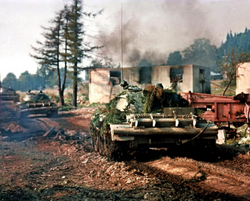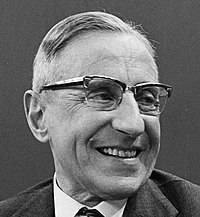Liothidian military intervention in Ommenlanden: Difference between revisions
No edit summary |
|||
| Line 43: | Line 43: | ||
== Background == | == Background == | ||
Ommenlanden had been under the rule of the [[All-Ommish Socialist Party]] since [[Ommish Revolution|revolution of 1943]], which had been fully-supported by [[Liothidia]]. With the outbreak of the [[Second Lio-Vannoisian War]] in 1945, Ommenlanden entered the war in alliance with Liothidia, being a significant player in the western front against Ostmark and XX. The war's end in 1951, left Ommenlanden significantly drained of manpower, wealth and industrial capacity, further entrenching its reliance on Liothidia. The election of [[Karsten Kroon]] as President in 1952, an unapologetic pro-Liothidian politician, led to the signing of the Treaty of Fraternity, Solidarity and Reconstruction between the two states, which granted Liothidia excessive access to Ommenlanden's mineral wealth. | |||
[[File:Jan de Quay 1963 (1).jpg|200px|thumb|left|Karsten Kroon served as President of Ommenlanden between 1952 and 1984.]] | |||
Kroon however, instituted a series of political reforms throughout the 1950s that partially opened the economy and political systems, which he used to further entrench his position. By 1965, Ommenlanden had exceeded its pre-war economic position and saw sustainable and respectful growth. During this time, Kroon had amassed such support and power that he became the subject of an extensive {{wp|cult of personality}} and the central source of power and authority in the single-party-state. Throughout the 1970s, with the implentation of [[Popular Socialism]] in Liothidia under [[Armin Stahl]], Kroon became concerned that Liothidia was diverging from socialist thought to swiftly and regularly refused to follow suit, even as Liothidia's economy boomed as a result. | |||
In 1980, Kroon suffered a stroke and withdrew from the public lime-light. His deputy, Gerard Nijboer assumed most of his duties and responsibilities. However, lacking his charisma and popular support, factionalism within the AOSP began to deepen and fracture party unity. In 1983, Kroon suffered a second stroke and died four weeks later on January 4 1984. Nijboer was elected as his successor, but failed to confront factionalism and disunity sufficiently, allowing for the division to breakout into political infighting and economic stagnation. | |||
=== Lost Decade === | === Lost Decade === | ||
=== Liothidia's position === | === Liothidia's position === | ||
== Operation Fraternity == | == Operation Fraternity == | ||
== Aftermath == | == Aftermath == | ||
Revision as of 15:58, 23 January 2019
This article is incomplete because it is pending further input from participants, or it is a work-in-progress by one author. Please comment on this article's talk page to share your input, comments and questions. Note: To contribute to this article, you may need to seek help from the author(s) of this page. |
| Operation Fraternity Operation Brüderlichkeit | |||||||
|---|---|---|---|---|---|---|---|
 Liothidian tanks advancing toward Alkmaar on 29 May 1994. | |||||||
| |||||||
| Belligerents | |||||||
|
|
| ||||||
| Commanders and leaders | |||||||
|
|
| ||||||
| Strength | |||||||
|
|
| ||||||
| Casualties and losses | |||||||
|
55 injured 29 injured |
2,084 injured or captured | ||||||
| 89 civilians killed or injured | |||||||
The Liothidian military intervention in Ommenlanden, officially known in Liothidia as Operation Fraternity (Liothidian:Operation Brüderlichkeit), was a week-long military operation, between May and June 1994, against the Ommish government under Johannes Alders.
The operation came at the climax of the Lost Decade, which was a continious economic and political crisis that emerged following the death of long-time leader, Karsten Kroon. The operation involved a significant portion of the Ommish military and 36,000 Liothidian soldiers. The relatively bloodless invasion ended with the storming of the government district in Alkmaar and the mass purge of the Ommish communist government.
The Liothidian military began an occupation of Ommenlanden while appointing new leaders, who in turn, launched Liothidian inspired reforms of the political, economic and social systems of the country. The invasion preserved Liothidia's influence over the country and the location of Ommenlanden within its sphere of influence, while bringing political and economic stability, it remains one of the most hotly debated military actions of the late 20th century.
Over 500 pro-Alders soldiers and police were killed, alongside 89 civilians who died in fighting or accidents.
Background
Ommenlanden had been under the rule of the All-Ommish Socialist Party since revolution of 1943, which had been fully-supported by Liothidia. With the outbreak of the Second Lio-Vannoisian War in 1945, Ommenlanden entered the war in alliance with Liothidia, being a significant player in the western front against Ostmark and XX. The war's end in 1951, left Ommenlanden significantly drained of manpower, wealth and industrial capacity, further entrenching its reliance on Liothidia. The election of Karsten Kroon as President in 1952, an unapologetic pro-Liothidian politician, led to the signing of the Treaty of Fraternity, Solidarity and Reconstruction between the two states, which granted Liothidia excessive access to Ommenlanden's mineral wealth.
Kroon however, instituted a series of political reforms throughout the 1950s that partially opened the economy and political systems, which he used to further entrench his position. By 1965, Ommenlanden had exceeded its pre-war economic position and saw sustainable and respectful growth. During this time, Kroon had amassed such support and power that he became the subject of an extensive cult of personality and the central source of power and authority in the single-party-state. Throughout the 1970s, with the implentation of Popular Socialism in Liothidia under Armin Stahl, Kroon became concerned that Liothidia was diverging from socialist thought to swiftly and regularly refused to follow suit, even as Liothidia's economy boomed as a result.
In 1980, Kroon suffered a stroke and withdrew from the public lime-light. His deputy, Gerard Nijboer assumed most of his duties and responsibilities. However, lacking his charisma and popular support, factionalism within the AOSP began to deepen and fracture party unity. In 1983, Kroon suffered a second stroke and died four weeks later on January 4 1984. Nijboer was elected as his successor, but failed to confront factionalism and disunity sufficiently, allowing for the division to breakout into political infighting and economic stagnation.
